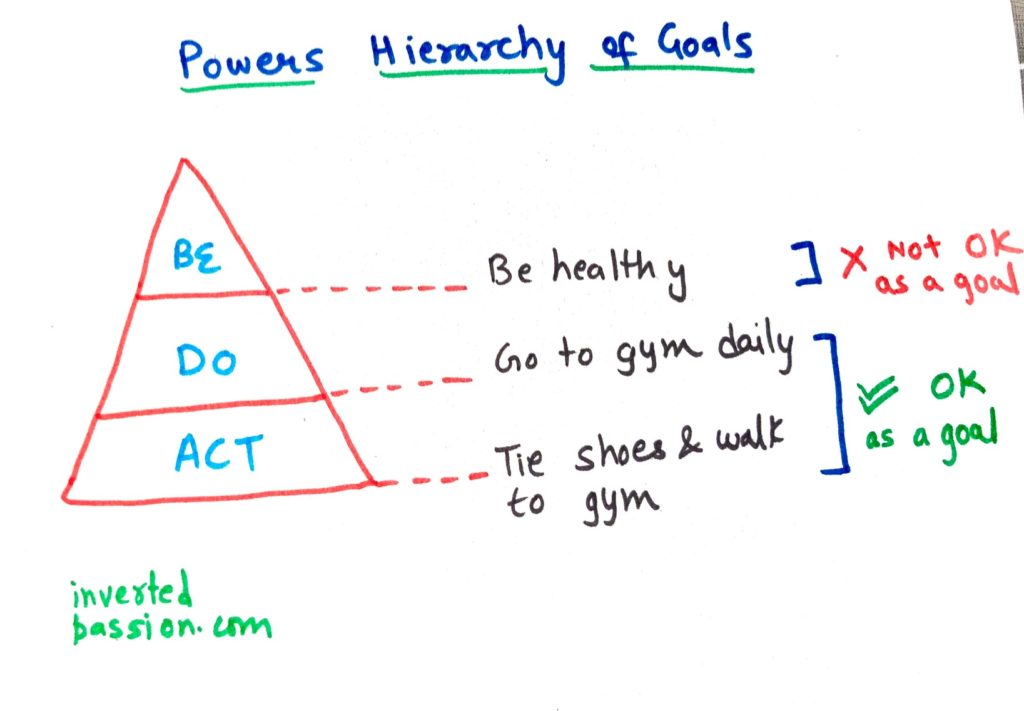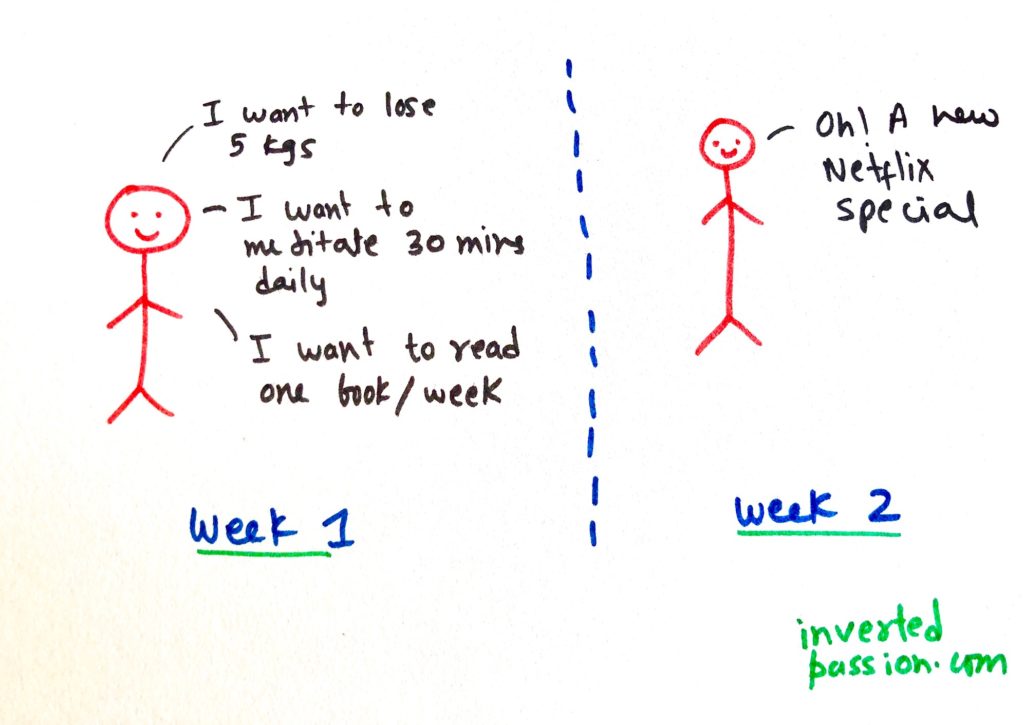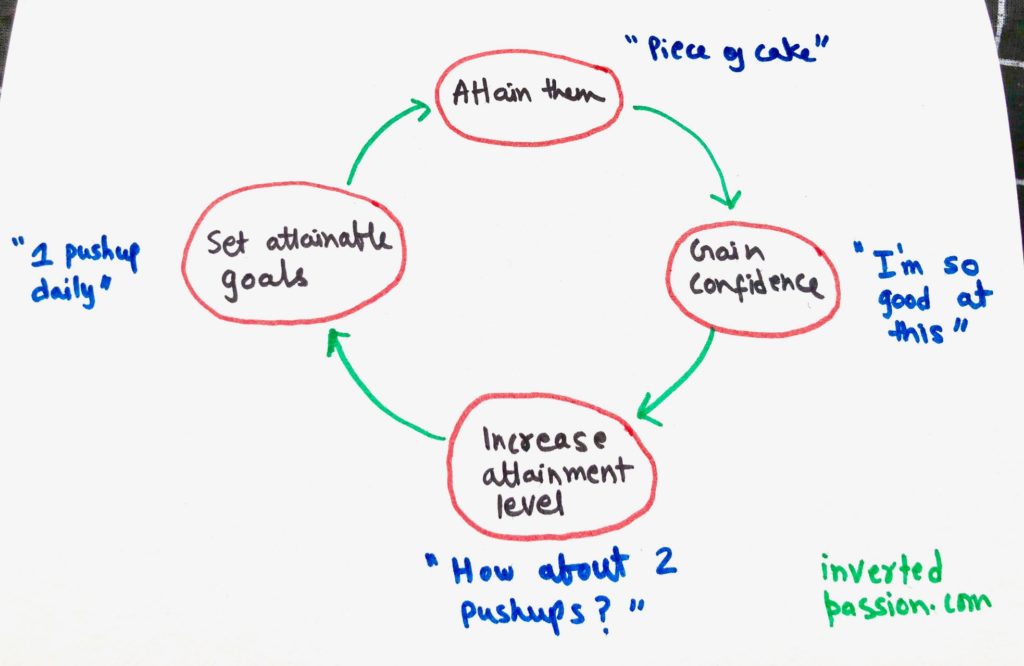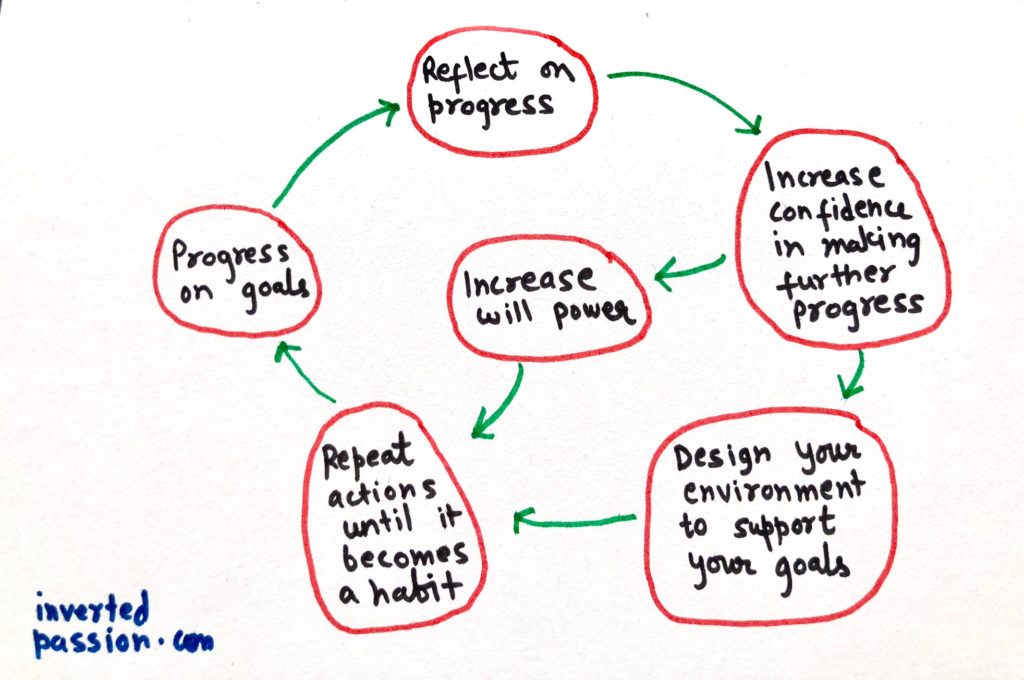It’s that time of the year when people set their new year resolutions. Most of these are health-related: losing weight, quitting smoking, reducing alcohol dependence, eating better or meditating. Everyone knows that failure rate of such personal goals is high. But psychologists are a curious bunch and wanted to be sure of that. In an experiment, they tracked people’s new year resolutions and discovered that only 40% reported sticking to their yearly goals by the end of six months.
I find this high failure rate for new year resolutions utterly fascinating. How can someone fail at achieving a goal that depends solely on their own actions? If your goal is to lose weight, why not simply start eating foods with less carbohydrates? Of course, intuitively we know that achieving personal goals isn’t as simple as that. Even the staunchest believers in free will fail at quitting smoking.
Whether you will achieve your new year resolutions or other personal goals depends on the goals you’ve chosen, the kind of person you are and the environment around you. Let’s explore these factors in detail.
Quantify what you want to be: set specific goals
Most people have a vision of their ideal selves. These are ‘be’ goals. We want to be rich, or famous, or skinny or all of these (not advisable, see below). These high-level goals are vague. For example, what does success mean? What does rich mean? This vagueness in goals, even though a natural impulse, backfires because it makes it impossible for you to know whether you’re progressing towards the goal or not. So, if a goal is important to you, quantify it. If you’re stressed about putting the right number to your goals, put any number or benchmark that feels attainable. The idea is to set a direction for you to know whether you’re making progress. If you feel the goal is too easy, take comfort in the fact that you can always increase it later.

Willpower as a limited resource: set few goals
One of the most famous results in psychology is that willpower is a limited, consumable resource. This has two implications: a) because willpower is limited, you can only spend it on a limited number of goals; b) because willpower is a consumable resource, self-control towards one goal (say, not eating your favorite food) makes it less likely for you to have self-control towards another goal (say, reading a book). Note that all acts of self-control consume the same resource, so if you had to sit through a boring meeting, you are likely to give in to a temptation later in the day (by binge eating, drinking or smoking).

What limited willpower means for personal goals is obvious: you actually reduce your chances of attaining any goal if you have multiple goals.. My personal experience suggests that one goal is ideal and I recommend it for people who seem to always set too many goals and not achieve them. What’s interesting is that researchers have found the willpower to be trainable over time. Just like a muscle, you can train it to be stronger over time. This means that as you exercise more self-control, your ability to self-control increases. So over time, as you get better at attaining goals, you can include multiple goals. But to start with, start with one goal.
Confidence matters: set attainable goals
Success depends on four factors: skill, effort, strategy and luck.. Skill cannot be developed overnight and is irrelevant for many personal goals (like losing weight, quitting smoking). Luck is a factor that by definition cannot be controlled. So what determines whether you’ll achieve your goals or not is your effort and strategy.
There’s one common factor that contributes to our persistence in achieving goals and effort we put in coming up with good strategies or plans. It’s our confidence in abilities, or expectation of achieving our goals. If we’re confident of achieving our goals, we simply put more effort and make better plans. People who are not confident of achieving their goals give up too soon.
Psychologists call confidence in abilities ‘self-efficacy‘. And in their research, they have repeatedly found it to be more important than all other factors in predicting whether a person will achieve a goal or not.
Even though research says that it is the confidence in abilities (and not actual abilities) that matters, in my experience these two are related. You get more confident in your abilities as you taste success. This sets a positive feedback cycle in which achievement of goals leads to further achievement of goals. To kickstart this cycle, my recommendation is to start small. Aim for a really tiny goal that you are confident of achieving and use the confidence to up the level up. I have had personal experience with this. For most of my 20s, I’d regularly resolve to run a marathon or join a gym to get into a good body shape. This never worked as I got bored while exercising. Last year, I set myself a tiny goal: do just five push-ups for two days in a week. Over time, I built my confidence and as I went through the year, I found myself doing as many as 30 push-ups.
Self awareness increases goal achievement: reflect regularly
There’s another factor that determines performance on goals: how aware are you about yourself. Psychologists call it self-awareness. Most of our day is usually spent attending and responding to our environment and we don’t get to think much of ourselves. However, whenever we do reflect, we focus on where we are and where we want to be. This self-awareness of the discrepancy between current state and desired state, coupled with a confidence in our ability to reduce that discrepancy, makes us strive harder and plan better. Hence self-awareness increases our chances of achieving goals.
We have a tendency to get distracted by events that happen in our daily life. This distraction is a hindrance to achieving our goals. So to overcome these distractions, continual self-awareness is important. Otherwise, it’s quite possible that in the heat of the moment, we forget about our goals and only later reflect on the lost opportunity.
Apart from keeping us focused on goals, self-awareness also increases our confidence (which further fuels goal achievement). This happens because during self-awareness, you not only reflect on where you want to be, you also reflect on what you’ve achieved so far. Going back to my earlier example, what helped do more push-ups was to mentally congratulate myself every day I did push-ups. If I had gone about mindlessly doing these push-ups, I could have easily found myself getting distracted by something else later and then forgetting to resume my regime. My continual, explicit awareness about sticking to my goal helped me in achieving it.

Self-awareness doesn’t happen automatically. People become more self-aware when they’re in front of a mirror. If that makes you awkward (it makes me cringe), you need to take time out for yourself every day and explicitly note in your mind how you’re doing on goals you set for yourself. An even better idea would be to keep a private daily journal and write down how you’re doing on your goals every day.
It’s not important to announce (say tweet or post it). The objective of writing is to simply remind yourself of your goals and your progress on it. However, what’s extremely important is to note only positive actions or progress, and not to get into the mode of blaming or self-loathing. Blaming (“I’m incapable of doing pushups”) is negatively correlated with achievement of goals. So make an explicit rule to only note or write down positive actions towards your goals. Mentally celebrate small victories in your life and gradually you’ll get more confidence and hence put more effort into achieving bigger goals. It’s a positive feedback cycle. Recognize it and then exploit it to your advantage.
Design your environment to help you achieve goals: remove impulses and distractions
Since willpower is a limited resource and our modern environment is full of temptations (hello Twitter!), you should work with an assumption that it’ll be extremely hard for you to stick to your goals. The day you decide to read a book, Netflix will release a new series. If you plan on reducing alcohol, a friend will call you for a party. Resisting temptations requires self-control and remember it’s a consumable resource. Because of this, you just cannot resist some temptations but not all. At the end of the day, you will give in. This is also why I try scheduling most of my new goals or habits early in the day. (Read my earlier article on hacks to avoid cognitive biases).
Reflecting on the nature of our environment at office and home is the first step in designing it in our favor. If your goal is to eat healthily, stop buying and stocking unhealthy stuff in your kitchen. If you find it hard to resist buying unhealthy items, start taking limited cash to purchase grocery. If a goal is important to you, you’d have to work on your environment as much as on yourself.
I love tweaking my environment in my personal and professional life. At one point in Wingify, I wasn’t getting time for thinking and reading (aka deep work). So I resolved to take out time for myself. But that did nothing. I read for the first few days and soon I found myself involved in the same routine because the environment I had was a hindrance to my goal achievement. Whenever I had to send someone an email, I’d get to see a new email in my inbox and start replying. People blocked my time for meetings because it was easy.
I made some simple changes and started finding more time in my workdays. These changes included installing a plugin that doesn’t show your inbox but lets you compose an email, and block time for thinking on my calendar for future, weeks in advance. At another point in Wingify, when I felt that I wasn’t working hard enough, I went ahead and coded a Chrome extension that on each new tab, reminded me of how many weeks are left before I die. So instead of just relying on willpower to put in more hours at work every day and then finding myself getting distracted by Netflix, I made sure I was constantly reminded that I wanted to work harder. Another example of tweaking the environment: just today I tweeted about making a Chrome extension that blocks counts (retweets, likes, etc.) on twitter.com as I find such numbers generate anxiety (due to automatic comparisons like ‘how did that tweet get so many retweets but my genius tweet was ignored’). I know it’s silly to get anxious by looking at retweets that others got but for me no amount of intellectualization changes that emotional response. I’m happy to note that much to my surprise, Jagan made this Chrome extension that now I’ve installed.
So I’ll reiterate: to change yourself, design your environment first.
Hacks for habit formation: sticking to goals
After the initial enthusiasm, interest in goals generally fades. The same research paper that I quoted earlier in this article found that for new year resolutions, the first-week success rate for their sample group was 77% while after the first month, it dropped to 55%. (Recall that six month success rate was 40%). This meant that more people dropped out from their goals in the first few weeks than they did in subsequent months. This indicates that for people who stick initially, after a period of time, their efforts towards their goals became automatic habits (that don’t require willpower.)
If you do the same activity at a similar time of the day, it gradually becomes a habit. In popular-science blogs, 66 days is what’s quoted as median habit formation period. But if you read the original paper, you’ll find that the actual range is as wide as 18-254 days. Also, the researchers of that study found that complex habits (such as exercising) take more time than simpler habits (eating fruit after breakfast).
In another paper on habit formation in new gym members, researchers found that it took minimum of 6 weeks of gym going with a frequency of 4 times/week to form a habit. Note that this figure of 6 weeks is a minimum. Many people take as much as many months to form a habit. (A meta-point here is to always read original papers; the frequently cited 66 days figure is median but the wide range suggests significant variation from person to person).
Researchers have theorised and empirically discovered that the strongest predictor for habit formation is repetition under consistent context (cue). It’s also called habit stacking. Consistency during long periods is extremely important to form habits.
This is where designing your environment comes in. Set up things around you so that you are forced to take actions on your goals every day. I know of a few ways to do that:
- Block time in your day (mentally or in calendar) to do activities towards your goals
- Reserve the same spot or location each day in your house or office to do the activity
- Cue your new activity with an existing activity (like breakfast, commute, dinner, etc.)
- Set future reminders on your phone to remind you every day about the activity
- Ask your friend or colleague to message you and ask whether you did the activity every day
- Use cognitive biases such as sunk cost in your favor by prepaying for gym, holidays, apps, etc.
Putting it all together: the goal attainment system
I realize that all that I’ve written might be too much to internalize in one go. So to help you, I’ve created a system diagram below that summarizes the best practices of achieving goals. I highly encourage printing it and sticking it somewhere accessible.

If you miss your goals, you’re still awesome
I’d like to leave you with an important point: your goals are nobody’s choice but yours and not achieving them is not a judgment on your worth. Personal goals are called personal for a reason. So even if you fail at your goals repeatedly, do not confuse that objective fact (“you were not able to lose 5 kgs this year”) with a subjective opinion (“you are a failure”). You are a cause of happiness to your friends and family, and if your goal is to be happy, there should be no guilt in being happy by watching Netflix or eating a packet of chocolates.
No matter what others say, what you make of success or failure is entirely in your head.
What are YOUR new year resolutions and how you plan to achieve them?
Now that you’ve read the article, I have a question for you.
What are your new year resolutions and what (life and behavioral) hacks are you considering to achieve them?
I’ll RT interesting hacks.
— Paras Chopra (@paraschopra) January 1, 2018
What are your hacks to achieve your new year goals? Tweet your response to me as a reply to this thread and I’ll retweet the most interesting responses. In the same thread, you can also check out and comment on what others proposed.
Join 200k followers
Follow @paraschopra